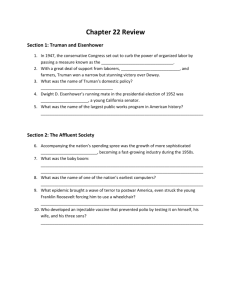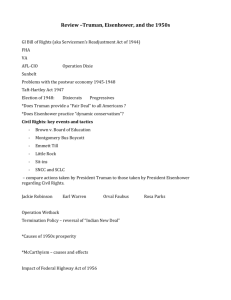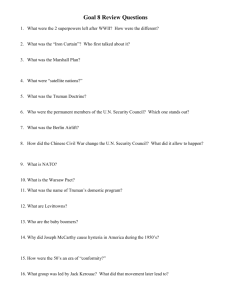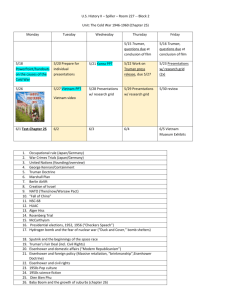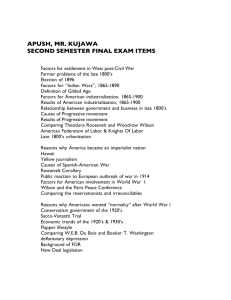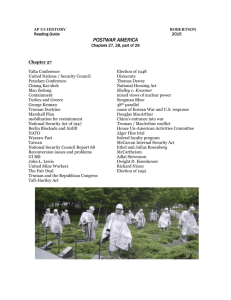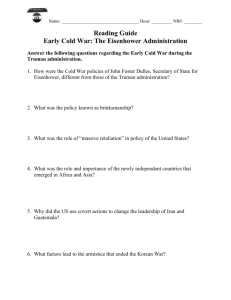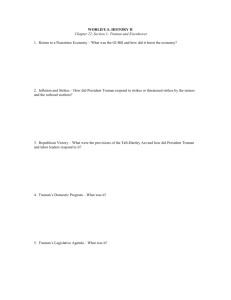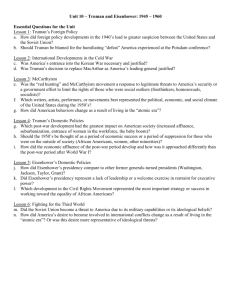American Pageant Questions Chapters 37, 38, and 39 CHAPTER 37
advertisement
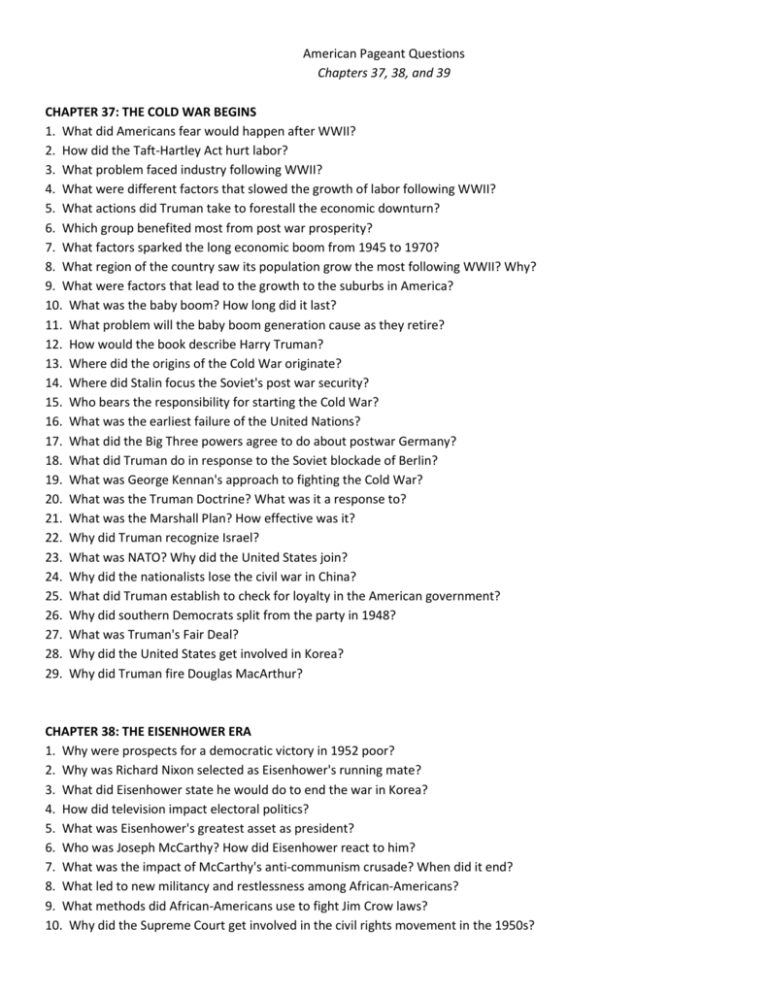
American Pageant Questions Chapters 37, 38, and 39 CHAPTER 37: THE COLD WAR BEGINS 1. What did Americans fear would happen after WWII? 2. How did the Taft-Hartley Act hurt labor? 3. What problem faced industry following WWII? 4. What were different factors that slowed the growth of labor following WWII? 5. What actions did Truman take to forestall the economic downturn? 6. Which group benefited most from post war prosperity? 7. What factors sparked the long economic boom from 1945 to 1970? 8. What region of the country saw its population grow the most following WWII? Why? 9. What were factors that lead to the growth to the suburbs in America? 10. What was the baby boom? How long did it last? 11. What problem will the baby boom generation cause as they retire? 12. How would the book describe Harry Truman? 13. Where did the origins of the Cold War originate? 14. Where did Stalin focus the Soviet's post war security? 15. Who bears the responsibility for starting the Cold War? 16. What was the earliest failure of the United Nations? 17. What did the Big Three powers agree to do about postwar Germany? 18. What did Truman do in response to the Soviet blockade of Berlin? 19. What was George Kennan's approach to fighting the Cold War? 20. What was the Truman Doctrine? What was it a response to? 21. What was the Marshall Plan? How effective was it? 22. Why did Truman recognize Israel? 23. What was NATO? Why did the United States join? 24. Why did the nationalists lose the civil war in China? 25. What did Truman establish to check for loyalty in the American government? 26. Why did southern Democrats split from the party in 1948? 27. What was Truman's Fair Deal? 28. Why did the United States get involved in Korea? 29. Why did Truman fire Douglas MacArthur? CHAPTER 38: THE EISENHOWER ERA 1. Why were prospects for a democratic victory in 1952 poor? 2. Why was Richard Nixon selected as Eisenhower's running mate? 3. What did Eisenhower state he would do to end the war in Korea? 4. How did television impact electoral politics? 5. What was Eisenhower's greatest asset as president? 6. Who was Joseph McCarthy? How did Eisenhower react to him? 7. What was the impact of McCarthy's anti-communism crusade? When did it end? 8. What led to new militancy and restlessness among African-Americans? 9. What methods did African-Americans use to fight Jim Crow laws? 10. Why did the Supreme Court get involved in the civil rights movement in the 1950s? 11. What was the verdict in the Brown v. Topeka Board of Education decision in 1954? What decision did it overturn? 12. How would Eisenhower's attitude towards racial justice be characterized? Examples? 13. What was the SNCC? 14. What was an economic problem of the 1950s? 15. What were Eisenhower's policies towards Native Americans? 16. What was the largest public works project under Eisenhower? 17. How did Ike react to the Hungarian revolution of 1956? 18. Who was the leader of the nationalist movement in Vietnam? 19. What was the 1955 Geneva Conference? 20. How did the US react to the 1956 Suez Canal crisis? 21. Where did the US engineer pro-American coups in the 1950s? 22. What was the "Eisenhower Doctrine?" 23. What was the US response to Sputnik in 1957? 24. What caused the 1960 Paris summit to be cancelled? 25. What may have tipped the scales for Kennedy in the election of 1960? 26. What were some of the new cultural characteristics of America in the fifties? 27. How would the literary movement of the 1950s be characterized? 28. How did the work force change in the 1950s? 29. What was the criticism of the consumerism of the 1950s? 30. How did sports reflect society in the 1950s? 31. Who wrote The Feminine Mystique? What was its impact? 32. What led to the rapid upsurge of employment by women following WWII? CHAPTER 39: THE STORMY SIXTIES 1. What became one of Bobby Kennedy's focuses as he became attorney general? 2. How did JFK choose to attack a sagging economy? 3. What was Charles DeGaulle's opinion of America? 4. What was the 1962 Trade Expansion Act? 5. What was JFK's "flexible response?" How was it received? 6. Why did America get involved in Vietnam? 7. What was the Alliance for Progress? 8. How did JFK react to the Soviet installation of nuclear weapons in Cuba? 9. What was the Cuban Missile Crisis? Results? 10. What was important about JFK's 1963 American University speech? 11. Why did JFK move slowly in the area of racial justice entering office? 12. When did JFK join with the civil rights movement? 13. How did JFK react to the Little Rock crisis? 14. Who led the government investigation into the Kennedy assassination? 15. Where did LBJ prove to be more successful then JFK? 16. What was the name of LBJ's domestic reform program? 17. What was the Tonkin Gulf Resolution? 18. Why did voters favor LBJ in 1964? 19. What were some of the programs started by LBJ's Great Society? Evaluation of their successes/failures? 20. What was the landmark Civil Rights Act of 1964? 21. 22. 23. 24. 25. 26. 27. 28. 29. 30. What was the Immigration and Nationality Act of 1965? What amendment was passed to help blacks vote in the South? What was the Voting Rights Act of 1965? What was the significance of the Watts Riots? Who were some of the influential black leaders of the sixties and how did their policies differ? What was the most serious blow to LBJ's Vietnam policy? What happened at the 1968 Democratic convention? Who was the third party candidate in 1968? Impact? What did the major party candidates agree on regarding Vietnam? What were some factors resulting in the upheavals of the sixties?
